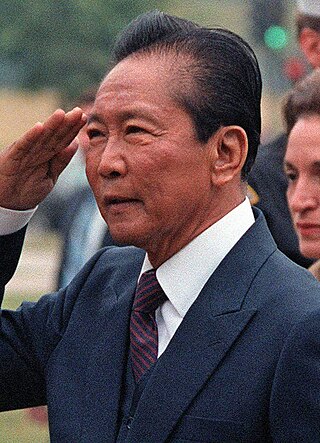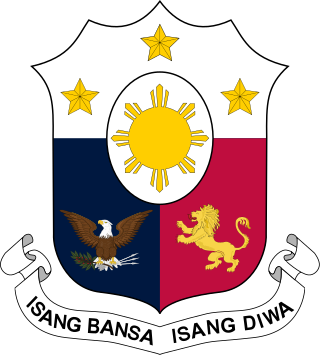
Ferdinand Emmanuel Edralin Marcos Sr. was a Filipino politician, lawyer, dictator, and kleptocrat who served as the tenth president of the Philippines from 1965 to 1986. He ruled under martial law from 1972 until 1981 and kept most of his martial law powers until he was deposed in 1986, branding his rule as "constitutional authoritarianism" under his Kilusang Bagong Lipunan. One of the most controversial leaders of the 20th century, Marcos's rule was infamous for its corruption, extravagance, and brutality.

The Communist Party of the Philippines is a far-left, Marxist–Leninist–Maoist revolutionary organization and communist party in the Philippines, formed by Jose Maria Sison on 26 December 1968. It is designated as a terrorist group by the United States Department of State together with Sison and its armed wing New People's Army (NPA) in 2002. The European Union renewed its terrorist designation on the organization in 2019, though a 2009 ruling by the EU's second highest court delisted Sison as a "person supporting terrorism" and reversed a decision by member governments to freeze assets. According to the US' Central Intelligence Agency (CIA) World Factbook, the CPP and the NPA aims to destabilize the Philippines' economy and overthrow the national government.
The First Quarter Storm, often shortened into the acronym FQS, was a period of civil unrest in the Philippines which took place during the "first quarter of the year 1970". It included a series of demonstrations, protests, and marches against the administration of President Ferdinand Marcos, mostly organized by students and supported by workers, peasants, and members of the urban poor, from January 26 to March 17, 1970. Protesters at these events raised issues related to social problems, authoritarianism, alleged election fraud, and corruption at the hand of Marcos.

A parliamentary election was held in the Philippines on April 7, 1978, for the election of the 165 regional representatives to the Interim Batasang Pambansa. The elections were participated in by the leading opposition party, the Lakas ng Bayan (LABAN), which had twenty-one candidates for the Metro Manila area while the leading candidate was the jailed opposition leader Ninoy Aquino, and the Marcos regime's party known as the Kilusang Bagong Lipunan (KBL), which was led by the then-First Lady Imelda Marcos. Ninoy was allowed to run by his fellow partymates under the Liberal Party, who boycotted the election and was not allowed to campaign, and so his family campaigned for him. The night before the election on April 6, 1978, a noise barrage was organized by the supporters of (LABAN) which occurred up to dawn.

The history of the Philippines, from 1965 to 1986, covers the presidency of Ferdinand Marcos. The Marcos era includes the final years of the Third Republic (1965–1972), the Philippines under martial law (1972–1981), and the majority of the Fourth Republic (1981–1986). By the end of the Marcos dictatorial era, the country was experiencing a debt crisis, extreme poverty, and severe underemployment.

The Partido Komunista ng Pilipinas-1930 (PKP-1930), also known as the Philippine Communist Party, is a communist party in the Philippines that was established on November 7, 1930. It uses the aforementioned appellation in order to distinguish itself from its better known splinter group, the Communist Party of the Philippines.

Martial law in the Philippines refers to the various historical instances in which the Philippine head of state placed all or part of the country under military control—most prominently during the administration of Ferdinand Marcos, but also during the Philippines' colonial period, during the second world war, and more recently on the island of Mindanao during the administrations of Gloria Macapagal Arroyo and Rodrigo Duterte. The alternative term "martial law era" as applied to the Philippines is typically used to describe the Marcos martial law period specifically.
National Democracy (ND), known colloquially as natdem, is a political ideology and movement in the Philippines that aims to establish a people's democracy in the country. With the Communist Party of the Philippines as the vanguard party, the movement seeks to address what it deems to be the "root causes of social injustices affecting the Filipino masses" in what is analyzed to be a "semi-colonial and semi-feudal society", by confronting the "three fundamental problems" of imperialism, feudalism, and "bureaucrat capitalism".

Isang Bansa, Isang Diwa was the national motto of the Philippines from 1978 to 1986, during the presidency of President Ferdinand Marcos. It was adopted on June 9, 1978 by virtue of Presidential Decree No. 1413. The motto has been criticized and has been denounced as "the slogan of a fascist regime".
Student activism in the Philippines from 1965 to 1972 played a key role in the events which led to Ferdinand Marcos' declaration of Martial Law in 1972, and the Marcos regime's eventual downfall during the events of the People Power Revolution of 1986.

Batas Militar is a 1997 Filipino television documentary film about martial law under Ferdinand Marcos, and the ouster movement against him, the People Power Revolution. The film was directed by Jon Red and Jeannette Ifurung, with the former focusing on dramatizations.

Kabataang Makabayan, also known by the acronym KM, is an underground communist youth organization in the Philippines which was active from 1964 to 1975. It was banned by the Philippine government in 1972 when then-President Ferdinand Marcos declared martial law, and was driven underground. It was dissolved in 1975 along with other National Democratic mass organizations, as part of the National Democratic movement's change of strategy against the Marcos regime. Revived within the Manila-Rizal area in 1977 and later nationally in 1984, the organization continues to exist.

Rizalina "Lina" Parabuac Ilagan was an anti-martial law activist who belonged to a network of community organizations in the Southern Tagalog region in the Philippines.

At 7:15 p.m. on September 23, 1972, President Ferdinand Marcos announced on television that he had placed the entirety of the Philippines under martial law. This marked the beginning of a fourteen-year period of one-man rule that would effectively last until Marcos was exiled from the country on February 25, 1986. Even though the formal document proclaiming martial law—Proclamation No. 1081, which was dated September 21, 1972—was formally lifted on January 17, 1981, Marcos retained essentially all of his powers as dictator until he was ousted.
The dictatorship of Philippine President Ferdinand E. Marcos in the 1970s and 1980s is historically remembered for its record of human rights abuses, particularly targeting political opponents, student activists, journalists, religious workers, farmers, and others who fought against the Marcos dictatorship. Based on the documentation of Amnesty International, Task Force Detainees of the Philippines, and similar human rights monitoring entities, historians believe that the Marcos dictatorship was marked by 3,257 known extrajudicial killings, 35,000 documented tortures, 77 'disappeared', and 70,000 incarcerations.
The League of Filipino Students is a student-led national democratic mass organization and movement organized during the martial law era in the Philippines on September 11, 1977. It claims to be the leading anti-imperialist organization of the Filipino youth, under the ideological line of national democracy. It is part of the broader movement known as Bagong Alyansang Makabayan.
The Student Christian Movement of the Philippines (SCMP) is a youth ecumenical national democratic mass organization in the Philippines. It aims to uphold students rights and participates in numerous local and worldwide peoples' advocacies. As with other SCMs around the world, SCMP is a member of the World Student Christian Federation. In the Philippines, it is an associate member of the National Council of Churches in the Philippines (NCCP) and Kalipunan ng Kristiyanong Kabataan sa Pilipinas (KKKP). It is also a member and a founding organization of Kabataan Partylist.

The Anti-Subversion Act of 1957, officially designated as Republic Act No. 1700, is a Philippine law which outlawed the Communist Party of the Philippines of 1930, the Hukbalahap, and any organizations succeeding these two organizations including the Communist Party of the Philippines, the National Democratic Front of the Philippines, and the New People's Army, on the grounds that these groups is involved in a "conspiracy to overthrow the government and imposed a totalitarian regime". It also prohibited association with these groups.
Anakbayan is an international militant youth organization espousing Marxism–Leninism–Maoism and National Democracy based in the Philippines. It is part of the broader Bagong Alyansang Makabayan, a left-wing alliance in the Philippines.
The Samahang Demokratiko ng Kabataan, better known simply by its acronym, SDK, was a mass organization of student and youth activists who pushed for the ideology of National Democracy in the Philippines during the Marcos dictatorship. Initially established on January 30, 1968 by activists who broke away from the Kabataang Makabayan (KM), it eventually reconciled with KM under the multi-sectoral Movement for a Democratic Philippines (MDP) in the common effort to fight the dictatorship of Ferdinand Marcos. Declared illegal along with any other political organizations when Marcos declared Martial Law in September 1972, it was eventually dissolved in 1975 as the socialist-led resistance to Marcos' martial law administration shifted its tactics away from mass youth organizations.












